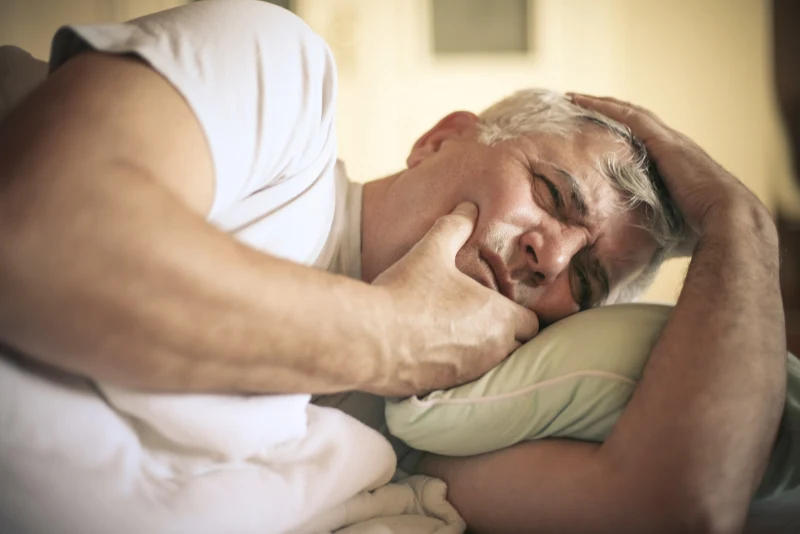Nothing is more distracting than a nagging toothache, especially when trying to get a good night’s sleep. The constant throbbing pain can disrupt your sleep and make you tired and irritable the next day. Now you might think about how to sleep with a toothache.
There are reliable ways to minimize the discomfort and get a better night’s sleep. Pain relief medications, cold compresses and numbing gel can help reduce the pain so that you get a more restful sleep. You should avoid eating or drinking before bed and elevate your head so the pain does not worsen.
Here, we’ll discuss the above tips and causes of toothache. Let’s get started.
Tips on How to Sleep with a Toothache
A toothache is one of the most terrible experiences, especially when getting a good night’s sleep. The pulsating pain can leave you feeling restless, irritable, and deflated. Here are several tips to help you sleep with a toothache:
No 01: Taking Pain Medication
If you are experiencing a toothache, taking pain relief medication as directed by your doctor or pharmacist can be helpful. One such recommended medication is Clonazepam 2mg, which can alleviate anxiety during sleeping time.
But, addressing the root cause of the toothache is crucial, which may require a dental check-up. Dental problems left untreated can lead to chronic discomfort and anxiety. Avoid taking more than the recommended dosage and consult your healthcare provider before taking any medication.
No 02: Applying a Cold Compress
One effective method to relieve toothache pain so you can sleep more comfortably is applying a cold compress. You can place a towel-wrapped bag of frozen peas on the cheek near the affected tooth to do this.
Leave it on for fifteen to twenty minutes at a time. This approach can help to numb the affected area while reducing swelling. Inflammation is a common result of toothache pain, and cold compresses can help to alleviate this symptom by lessening the swelling.
No 03: Rinsing with Salt Water
Another way to manage toothache pain is to use salt water to rinse your mouth. You can make your own mix by adding about 1/2 teaspoon of salt to some warm water. Take 30 seconds to spit out the mixture after swishing it around in your mouth.
This solution can help alleviate your pain by reducing inflammation and swelling. Salt acts as a natural antimicrobial, which can help disinfect the affected area and prevent future infections.
No 04: Elevating Your Head
You can also relieve toothache pain by elevating your head. One way to do this is by propping up your head with one or two extra pillows. Raising the head slightly above the heart can reduce pressure in the head area.
This can help to alleviate both the swelling and pain associated with toothache. Not only can this technique help you sleep more comfortably, but also, it can reduce the frequency and intensity of headaches.
No 05: Using a Numbing Gel
The use of numbing gels can provide temporary relief from toothache pain. One common ingredient used in such gels is benzocaine. Apply a small amount directly to the affected tooth to use the gel. This can help to numb the pain you’re feeling and may allow you to sleep more easily.
Benzocaine works by blocking the transmission of pain signals from the affected area to your brain. Consult your doctor if you have any allergies or concerns about using numbing gels.
No 06: Avoiding Eating or Drinking Before Bed
Eating or drinking anything sugary or acidic before bed can exacerbate toothache pain. As a result, avoiding eating or drinking anything for at least an hour before bedtime is essential.
Sugar and acidic substances can erode tooth enamel, exacerbating the underlying pain and eventually leading to more severe dental problems. Instead, drink plenty of water and maintain good oral hygiene habits. Brush your teeth gently without aggravating the affected tooth before bedtime.
No 07: Seeing a Dentist
In any case, the most effective and long-term solution to toothache pain is to see a dentist. If your pain persists after trying these tips and tricks, visiting a dental office as soon as possible is crucial. Untreated dental issues can cause ongoing pain, swelling and infection.
A dentist can identify and treat the underlying cause of your toothache. Regular check-ups can help you to maintain good overall oral health, too.
What Are the Causes of Toothache?
While various factors can cause toothache, the most common causes are given below:
Tooth decay: When bacteria in the mouth break down sugars and starches, they produce acid that can erode tooth enamel and cause cavities. This can lead to toothache when the decay reaches the nerve inside the tooth.
Gum disease: Gum disease, also known as periodontitis, can cause inflammation and infection in the gums, leading to toothache.
Tooth abscess: An abscess is a pus-filled pocket that can form at the root of a tooth or in the gum tissue. It can cause severe pain, swelling, and sensitivity.
Teeth grinding: Grinding or clenching the teeth can cause wear and tear on the teeth, leading to toothache.
Tooth trauma: The tooth or surrounding tissue injury can cause toothache.
Sinus infection: A sinus infection can cause pressure and pain in the upper teeth, which may be mistaken for a toothache.
Dental procedures: Some dental procedures, such as fillings, root canals, and extractions, can cause temporary toothache.
Unlock the Secret to a Restful Night’s Sleep Despite Toothache Pain
Toothache pain can make getting a good night’s sleep seem like an impossible feat. But, following the tips and tricks outlined in this blog post, you can help keep the discomfort to a minimum and sleep better.
Take pain medication, apply a cold compress, rinse with salt water, use a numbing gel, and avoid eating & drinking before bed. Each method can help reduce the pain and give you a more restful night’s sleep.
Remember, if your toothache persists or worsens, you must see a dentist as soon as possible to identify the underlying cause of your pain. A good night’s sleep is within reach, even with a toothache.




